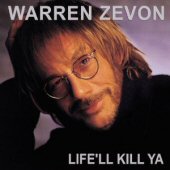 Warren Zevon: Life’ll Kill Ya, Artemis
Warren Zevon: Life’ll Kill Ya, Artemis
Warren Zevon is one of the more astute chroniclers of modern life. Like Tonio K, he has an all-too-rare take on the world we live in, where everything is for sale at the right price. Usually cheap. The most cutting of the seventies L.A. rock crowd, he was out of place even at his commercial peak. Jackson Browne has described him as the “first and foremost proponent of song noir.” Others sang of peaceful easy feelings, Zevon offered an far more unsettling – albeit believable – worldview. Highly literate, his idiosyncratic songs draw comparisons to novelists as often as other songsmiths.
At the age of twelve he was a classical music prodigy, writing twelve-tone music in the style of Stockhausen and befriending Russian composer Igor Stravinsky. A few years later an about face, brought on by ‘peer pressure, puberty” and the realization that classical music was hardly grabbing the ear of his generation, resulted in his working within a more contemporary form – pop music.
He penned a couple of singles for the Turtles, scored television commercials, and placed a song on the Midnight Cowboy soundtrack. His first solo effort, Wanted Dead Or Alive (1969) was ignored, and he moved to Spain in 1970.
Returning to America, he put in a stint as bandleader for the Everly Brothers before releasing an eponymous-titled album on Electra 1976. Perceived as his real debut, the record garnered rave reviews.
Life’ll Kill Ya is his thirteenth release. While long-time problems with alcohol have been dealt with, he’s hardly mellowed. The personal habits may be cleaned up, but the bite is as strong as ever. Aging and mortality are constant themes, and religious imagery is employed on numerous occasions.
“I Was In The House When The House Burned Down,” an allegory to our limited time on the planet, includes a reference to Simon of Cyrene – ‘I met the man with the thorny crown/I helped Him carry his cross through town.” The closer, “Don’t Let Us Get Sick,” is a perfect prayer for the middle-aged non-believer. The title track, dealing with the inevitability of death, questions the possibility of heaven or reincarnation, and ends neatly with the Latin phrase ‘Requiescat in pace (Rest in peace)/That’s all she wrote.’
One of the more intriguing numbers is “Hostage-O” which might be about turning over one’s will to the creator of the universe, but could just as easily concern a more earth-bound submissive/dominant relationship.
‘Ourselves To Know’ employs the Crusades as an image to mirror life’s journeys.
There are more than a few instances of profanity on the disc, but like all great art, that’s hardly the point. ‘My S---’s F----d Up’ offers one of the sadder refrains: ‘That amazing grace/Sort of passed you by/You wake up everyday/and you start to cry.’ Anyone more concerned with the number of curse words per song would best avoid this disc, but for those willing to hear what’s being said, a great disc from a great writer.
Zevon explained the focus: “Old age is an equally appropriate if not more appropriate subject for rock and roll than misunderstood youth.”
© John Cody 2000